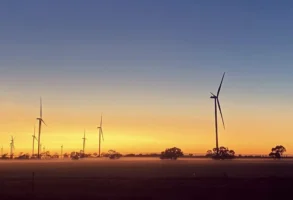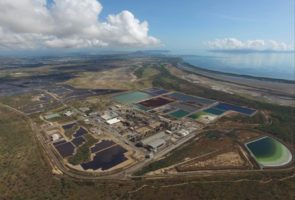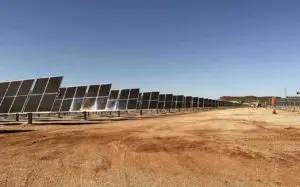One of the world’s most recognisable companies, Mars, owning brands such as Masterfoods, Pedigree, and M&Ms, is completing the transition to 100% renewable electricity for its six Australian factories and two offices.
Mars Australia announced back in 2018 that it had signed a 20-year Power Purchase Agreement (PPA) with Total Eren to produce the equivalent of all its electricity needs from the 200MW Kiamal Solar Farm.
Purchasing 50MW from the 200MW Kiamal solar farm, now nearly fully commissioned, Mars Australia will now power its six manufacturing sites across the country – in Asquith, Ballarat, Bathurst, Wacol, Wodonga, and Wyong – and two sales offices in Melbourne and Sydney with 100% renewable electricity.
According to Mars, the 50MW purchased from the Kiamal Solar Farm is enough renewable electricity to power the production of 185 million 180-gram bags of M&Ms Peanut, or 30 million 3-kilogram bags of Pedigree, or 1.4 billion bottles of Masterfoods tomato sauce, or 2.5 billion packets of Extra chewing gum.
“I am proud to announce that we are making the switch to 100% renewable electricity,” said Bill Heague, General Manager Mars Food Australia.
“At Mars, we believe business, government, and individuals must work together to take meaningful action on climate change. This move ensures we are playing our part to create a better world for future generations.
Mars Australia’s move to 100% renewable power is part of its parent company’s larger promise to reduce its global greenhouse gas emissions by 27% by 2025 and 67% by 2050, and underlines the company’s $US1 billion 2017 commitment to reduce its environmental impact.
The news of the milestone was welcomed by environmental groups, including the RE100 global initiative, which encourages businesses from around the globe to commit to 100% electricity. The initiative now has more than 280 member companies.
“Mars was one of the first RE100 pioneers to sign a power purchase agreement here in Australia,” said Jon Dee, RE100 Australia Coordinator. “By sourcing 100% of their electricity from renewable sources, Mars isn’t just reducing its impact on the environment, it’s also setting a great role model for other companies.
“Last year Mars consumed over 85GWh of electricity in Australia. In light of Australia’s fluctuating energy costs, it’s a sound business decision for Mars to invest in that amount of solar power. Other companies in Australia need to follow that lead.”
The Kiamal Solar Farm was subject to long delays due in part to bottlenecks in the West Murray region of the grid, and suffered problems which ultimately led to Greek-based international contracting group a Ellaktor and its local subsidiary Biosar to quit the Australian solar market after posting huge losses from its construction portfolio.
Project Developer Total Eren says Kiamal, the biggest solar farm in Victoria, is backed by four different Power Purchase Agreements (PPAs) and one large-Scale Generation Certificates (LGCs) contract, including to Mars Australia, Alinta Energy, FlowPower, Zero Emissions Water and Origin Energy.










